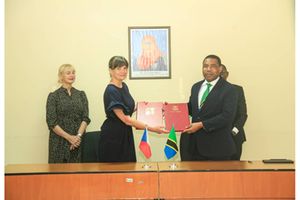Do we need Ujamaa and self-reliance or individualism and dependency?

Marie Memouna Shaba
What you need to know:
- Nobody heeded these voices in the wilderness because we didn’t have the perseverance to sacrifice or diligence to build our economy using our resources.
Civic and political rights gained momentum and have dominated constitutional debates since we agreed to the conditions for economic reforms prescribed by the IMF and WB in the mid 80s.
Among other things we were told to restructure our economy and democratize our political institutions. We followed neo-liberal policies and “free” market, free media, multi-party democracy and human rights principles.
Abiding by the IMF/WB conditions made us eligible for loans and tied aid so that we can have strategies to reduce and not eradicate “poverty”. From that time onwards we were officially branded as underdeveloped, indebted, and the poorest country.
We were made to believe that we cannot share poverty because that is what Ujamaa and self-reliance is all about.
Many African countries were persuaded to follow neo-liberalism because socialism and communism had failed to solve chronic poverty and had lynched democracy.
Few leaders like Nyerere in 1987 publically discredited Structural Adjustment Programmes (SAPs) as prescribed by the IMF/WB as a death trap because the system was based on economic exploitation and repression.
Nobody heeded these voices in the wilderness because we didn’t have the perseverance to sacrifice or diligence to build our economy using our resources.
It was easy to get loans and alms or sell our hard built properties rather than evaluate what went right or wrong so that we could improve and decide on our destiny. We opened up our doors to the foreign direct investments to come and loot our resources mercilessly.
At that time the former President Mwinyi warned us that “When you open windows, you get fresh air and impurities”
It seems we got more infesters than investors! Why is it that after 28 years of SAPs we as Africans are worse off economically than the investors?
Why have we been advocating civic and political rights more than economic, social and cultural justice? We have done and given everything but are still indebted, corrupt, undemocratic, and underdeveloped.
When will it end? No wonder the tax payers in the West believe we must be corrupt and lazy because why can’t we take care of ourselves with such god given wealth? Now we know freedom is not free, freedom is a process and that SAPs with the IMF/WB is a never ending story either.
In the 1990s CSO in Tanzania, Kenya and Uganda were involved in a process called “Dawn for New Constitution.” The aim was to conduct mass civic education so that we make informed choices to the Constitution that we want.
However after more than 20 years each country went on at its own pace, for Tanzania we now have a draft Constitution ready.
The Constitution is the basic law from which we get other laws that govern the three organs of the Government namely the Executive, Legislature and Judiciary.
Which is probably right although there are other people lobbying for the Media to be the forth organ so that it can be made accountable by the constitution.
We can easily hold the government accountable on civic and political rights because the constitution is quite elaborate. But how can we demand for our economic, social and cultural rights?
The Human Rights Declaration recognizes economic, social and cultural rights, and we are signatories to the Convention. Some countries like the United States fear that if they recognize this Convention and ratify it people will demand for their economic rights which the government can’t fulfil. But why should a government fear providing for its people these very fundamental rights?
It was during industrial revolution that capitalism was institutionalized and it was also the beginning of workers and other groups fighting for their rights.
The sweet fruits of capitalism taught its proponents that if you want to do business separate human rights from business.
Promote civic and political rights so that it can divert people from demanding their economic, social and cultural rights.
Ujamaa and Self-reliance was trying to balance both political and economic rights. The Constitution was very clear that we intend to build our nation based on Ujamaa and Self-reliance.
That meant we were united as a community of destiny and the role of the political parties was to tell us how they will enhance respect for human rights and make us economically self reliant.
We are at war therefore the constitution has to reflect our resolve to fight for economic, social and cultural justice; the will of the people is to kill this myth that we are poor, dependent, inferior, and underdeveloped. Viva Tanzania.
Marie Memouna Shaba is a Tanzanian socio-economic analyst in the context of Cultural Heritage. [email protected]




